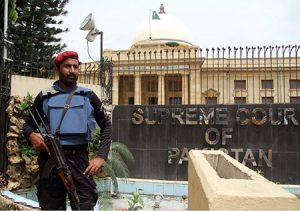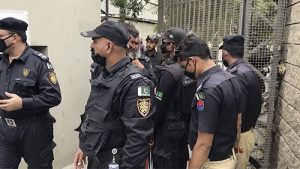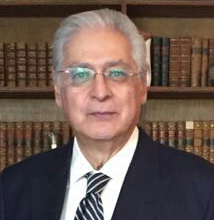To the average Pakistani, the police force is a web of harassment and extortion, which he should avoid at all costs. Courts mean expenditures and delays, and at the end of the day, justice is a hit or miss affair. The public seems to be reconciled to this sorry state of affairs, and improvement does not appear likely any time soon. From the point of view of the police and the judicial system, things are just as bad. The two functions of the police are maintaining security and investigating crime. The security police is under-funded, untrained, and insufficiently equipped to deal with the elements that destabilise the state. The criminal investigation wing is neither trained nor equipped for modern techniques of crime investigation. Criminal investigation in Pakistan follows methods that were discarded worldwide a hundred years ago. Torture and forced confessions are its method and they are not too concerned if their victims are innocent or guilty. In Pakistan, almost all available funds are spent on security, practically none on criminal investigation, which is primitive. And the country can boast no Sherlock Holmes or Hercule Poirots.
Meanwhile, the law courts are overworked and understaffed. There are over 2.1 million pending cases in Pakistan, with 3000 judges to try these cases. The Supreme Court has 51,000 pending cases but only 15 judges. Despite the overwhelming workload, 1000 judges’ posts lie vacant across the country. This year’s budget allocated Rupees 13.3 billion to the Law Ministry, of which Rupees 5 billion went to NAB, Rupees 3.2 billion to the Election Commission, and Rupees 2.8 billion to the Supreme Court. By comparison, the Ehsaas program has an allocation of Rupees 260 billion, twenty times the budget of the Federal Law Ministry. The Islamabad district judiciary decided about 70,000 cases during the year, but still has a backlog of 48,000 cases to be tried by the 70 working judges (30 seats are lying vacant). Its budget allocation is Rupees 645 million, as compared with the Rupees 494 million approved for the Federal Shariat Court with its 178 pending cases. But money is always available for preferred expenditures. Rupees 8.7 million was made available for replacement of the passenger lift in the Supreme Court, and Rupees 28 million for replacing two passenger elevators at the Federal Shariat Court building in Islamabad.

The 70,000 cases decided by the Islamabad district courts, with its budget of Rupees 645 million, work out at Rupees 9000 per case decision, a bargain when compared with the 178 pending cases with the Federal Shariat Court (with its budget of Rupees 494 million), which will cost Rupees 2.7 million per decision.
We are all aware of the weaknesses of our police system and the inadequacies of our courts, but successive governments have made the mistake of not recognising the importance of justice. This is surprising when we consider the importance given to justice in the early Islamic empires. Hazrat Omar was famous for his justice, Suleiman, the greatest of the Ottomans, was known as ‘The Lawgiver’, Akbar, the Great Mughal, considered it his duty to administer justice wisely. Sher Shah Suri was totally impartial in administering justice. Once, a Hindu merchant came to him complaining that his honour had been smeared by the prince, who came riding by on his elephant when the merchant’s wife was taking a bath. The prince had winked at her and thrown her a sweet. The shamed lady wanted to kill herself. Sher Shah Suri called his son who admitted to the offence. The king ordered his son to give his elephant to the Hindu merchant and to order his own wife to take a bath so that the merchant could, in turn, wink at her.
To the individual, an efficient system of justice gives him security of both person and property. To a nation, efficient justice creates a strong economy, as transactions grow when confidence in the system is strong. To foreign investors, efficient and reliable justice and security are essential for them to invest in a country. They must feel that their investment will be both profitable and safe. The flight of capital from Pakistan and the brain drain as Pakistanis emigrate, will stop if the laws and the way they are implemented render a sense of security.
Unfortunately laws in Pakistan and the way they are implemented protect the rich and punish the poor. There is a Russian proverb that ‘Laws rule people, and gold rules laws.’ In the criminal courts cases carry on forever. To proceed requires that the magistrate be present, the accused be present, the lawyers, and the witnesses. If anyone of the players are absent, the case is adjourned. Pressures from both sides leads to delays as the judge avoids a decision. Money and power influence the court and the police.
Civil litigation takes even longer than criminal. Procedures override justice. Appeal after appeal delays decisions as justice delayed is justice denied. Procedures are more important than right or wrong in deciding cases. The outcome is unreliable. There is an old saying that a contract is a web that ensnares the weaker, but which the stronger can break whenever he pleases. In the absence of sanctity of contract, business and the economy suffer.
The police is much hated in Pakistan and considered the most corrupt service. But the best way to understand the police is to learn from a policeman. Omar Shahid Hamid is a policeman who has written three novels on police life in Karachi, which show the reality of the shocking world of crime, terrorism, and politics in a city ruled by the MQM and infiltrated by religious extremists. Part fact and part fiction, his book The Prisoner shows that the police can be both heroes and criminals in the strange world where no clear line divides the law enforcers and the criminals. Omar Shahid Hamid describes the shootout which led to the death of Murtaza Bhutto when his sister, Benazir, was Prime Minister. There is no better illustration of the way the police operate in Pakistan, with pressure from political leaders, corruption, the role of money, and the unique personal code of honour that police heroes live and die by. Hamid says that in the decade 2000-2011 over 270 police officers were killed in Karachi.
Chaudhry Aslam Khan is a legend, Karachi’s Dirty Harry, a tough cop and Karachi’s most famous policeman. He was an encounter specialist, famous for his Glock revolver and his Gold Leaf cigarettes. He explained his extrajudicial killings of criminals, saying, “What choice is there in Karachi, where judges are scared, the politicians themselves criminals, and justice a purchasable commodity.” Aslam personally led assaults, was shot five times, survived eight assassination attempts, but never wore a bulletproof vest. He fought for the law while breaking the law. Aslam was finally assassinated by his enemies. The government gave his widow compensation of $460,000. The Taliban commander suspected of the assassination was himself killed in an encounter. Gangsters, politicians, police chiefs, army generals, and Asif Zardari paid their respects at his funeral.
The security police has demanded the lion’s share of the police budget to counter the threat of extremist Islamist groups which pose a danger to the state and its citizens. On January 4, 2011, Salman Taseer, the sophisticated governor of the Punjab, was assassinated by his bodyguard, Mumtaz Qadri in Islamabad. Qadri, whose duty was to protect the governor, emptied his machine gun into Taseer, threw down his weapon, raised his hands, and said to the other guards protecting the governor, “Don’t shoot. Arrest me.”
Salman Taseer was a charismatic figure, famous for his wit and humour. Once, when entertaining Hilary Clinton at the grand colonial Governor House, he walked her through the beautiful gardens saying, “We once used to ask distinguished visitors such as yourself, to plant a tree in the gardens of the Governor’s House. Even the Queen planted one.” “Has the tradition stopped?’ asked Clinton. “Well, Idi Amin planted one — but then he ate the gardener.” retorted Taseer.
Following his assassination, the then Prime Minister ordered three days of mourning for Taseer, but public opinion supported the assassin, who claimed, “He was a blasphemer and this is the punishment for a blasphemer.” In his trial, 300 lawyers offered their services gratis to defend Qadri, by now being called a hero of Islam.
No senior lawyer would prosecute him, instead rose petals were strewn over him when he appeared in public. His family said, “People who refused to even shake our hands earlier, now come to kiss our hands.” The chief cleric of the Badshahi Mosque refused to conduct prayers at Taseer’s funeral. And two weeks after Taseer’s assassination, Shahbaz Bhatti, the sole Christian minister in the cabinet, was gunned down in Islamabad. In August, Shahbaz Taseer, Salman’s son was kidnapped. Religious groups supported the assassination with demonstrations and in 2014 a mosque was built in Islamabad, named after Mumtaz Qadri. Qadri was executed on February 29, 2016, proclaiming till the end, “I have no regrets.” A hundred thousand attended his funeral and in the demonstrations that followed, a metro bus station was torched and countrywide protests commemorated the hanged hero. Taseer joins a long list of assassinated leaders in Pakistan that includes Liaquat Ali Khan, Zulfiqar Ali Bhutto, Zia-ul-Haq, Benazir Bhutto, Murtaza Bhutto, Nawab Akbar Bugti, Hayat Sherpao, and Fazle Haq.

Musharraf established NAB in 1999, announcing “NAB was created to put the fear of God in the corrupt.” By 2007, political expediency trumped putting the fear of God into the corrupt, and Musharraf passed the National Reconciliation Ordinance (NRO), granting amnesty to politicians. To date, NAB has decided mega corruption cases against an ex-president, 5 ex-prime ministers, 5 ex-chief ministers, and several cabinet ministers.
Opposition parties complain of selective accountability against those who do not support the government in power. Justice Baqar of the Supreme Court made scathing comments about the NAB in the Paragon Housing corruption case, “The bureau seems reluctant in proceeding against people on one side of the political divide, while those on the other side are being arrested and incarcerated.” In November 2020, Saleem Mandviwala, the Deputy Chairman of the Senate, blasted NAB publicly, “It is a blackmailing organisation. It is an extortion organisation. It is an organisation that violates human rights.”
The most tragic victim of NAB was Brigadier Asad Munir, who after retiring from military service, became Member Estates, CDA. Asad Munir committed suicide after NAB filed a corruption reference against him. He left a note, saying “I live in an apartment, don’t own a house anywhere in Pakistan, no business, no commercial property, only a 2005 model car. I am committing suicide to avoid humiliation, being handcuffed, and paraded in front of the media.”

The writer is a businessman and the author of three books including Muslims: The Real History.



